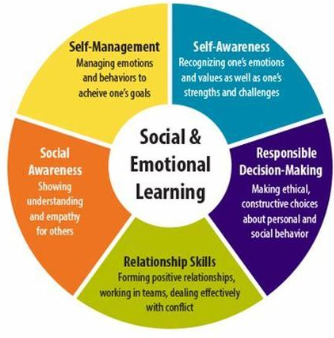The Suite Life
Welcome back to the The Suite Life! We are so pleased with the overwhelmingly positive feedback submitted by students following the first Social Emotional Learning (SEL) lesson with their Homeroom teachers on October 16. We sincerely hope this week’s lesson focusing on Managing Conflict is just as useful for all. This lesson aligns with the self-management core competency. 
Managing Conflict
What is Conflict?
Interacting with others in ways that respect individual and group differences is an important element to our school learning environment.
Everyone gets into conflicts--with a parent, teacher, friend, or stranger. Conflicts can be over anything, big or small. Conflicts can have positive outcomes. Students will be asked to think of a time a conflict turned out well and a problem was solved, a situation managed, or there was just a “clearing of the air.” Conflicts can also result in negative feelings that leave us feeling badly about ourselves and others. We want students to be able to exhibit the interpersonal skills to maintain quality relationships and to utilize and accept personal responsibility in relationships with others.
At the end of the lessons and activities, students will reflect on what they’ve learned about themselves and identify alternative ways for solving conflicts.
Six Strategies for Managing Conflicts
- Use “I” messages | State the problem in terms of how it makes you feel; do not place blame on the other person.
- Listen closely | Let the other person know you are willing to listen.
- Ask for help | A third person can often bring a new perspective or solutions to a conflict.
- Compromise | Be willing to consider options on which you both agree.
- Apologize | Let the other person know you are sorry the conflict happened, whether you feel you are right or wrong. Example: “We don’t seem able to solve this, but I am sorry you feel badly about it. I do too.”
- Be Mindful | Avoid no-win situations by cooling off and self-centering using breathing and mindfulness techniques.
Families, we encourage you to follow each SEL lesson with a discussion of the topics addressed, to further students’ learning and understanding.
October 28, 2020 SEL Lesson dinner table conversation starters:
- What are the characteristics of a quality relationship and what are ways to maintain it?
- What strategies do you use to manage conflicts? Do they work? What strategies would you like to try?
Family Resources:
- Schools, Families and Social Emotional Resources
- CASEL Parent Resources
- Confident Parents, Confident Kids Blog
Please contact us if you have any questions or concerns. Wishing you a fun and safe Halloween weekend!

Timely Topic | Communication Skills
Being able to express yourself effectively is a key Portrait of a Graduate skill. In this virtual world, email communication has become more important as the primary means of communication between students and staff. Now is a great time to hone this professional correspondence skill.
When addressing a teacher or other professional, emails should include:
- A subject line that hints at the email’s contents.
- A greeting/salutation, such as Dear Dr. Bonitatibus or Good morning Dr. Bonitatibus.
- Substance. Make sure to write in complete sentences, use good grammar, and ask questions clearly and specifically. When requesting a meeting or an appointment, suggest a few dates and times.
- Gratitude. Be sure to thank the person who is taking time to address your concern or answer your question.
- A closing/valediction, such as sincerely, thank you, warmly, regards, cheers, etc.
Communication and Student Self-Advocacy
Often students have questions about an assignment or grade and need to speak with a teacher for clarification. Timeliness is key with these concerns!
- Address any grade questions or concerns immediately when they arise (i.e. the day after a test is returned). The information will be fresh in the minds of both student and teacher and can be discussed most accurately. Do not wait several weeks or until the end of the grading period to ask.
- Have the conversation face to face. Email is great for asking for an appointment, but these assignment discussions are much more productive speaking to each other in person, albeit virtually these days!
- Be sure to focus on the material, not the grade. Our shared goal is learning. If a student is unclear about why something was graded a certain way, the teacher can provide clarification to ensure the student understands the concepts covered in the material to be successful moving forward.
- If points/grades are involved, students should seek only points/grades they have earned. For example, asking a teacher to raise your grade from a 92.4 to a 92.5, going from an A- to an A, is not appropriate if that 0.1 was not earned. In addition, if a student feels a particular problem was graded incorrectly (teachers are human too!), advocate for yourself and politely share why you think your answer is correct.
- Students should center the conversation around what they can do, not what the teacher can do for them. Being a good problem-solver and conflict-resolver means taking ownership of your actions and offering possible solutions.

Housekeeping Items in the Suite!
Address changes. Have you moved?
How to Report a Change of Residence to the TJHSST Admissions Office and TJHSST Student Services
IMPORTANT: 1) Address changes cannot be updated via the weCare system. 2) Changing the residency of another student in an FCPS school will not change that of a TJHSST student until the process outlined below is completed successfully.
-
Contact the TJHSST Registrar, Ms. Elizabeth West and the TJHSST Admissions Office by email and please provide the following information:
- Student Name
- Student FCPS ID Number
- Name of enrolling parent or guardian with contact information (email and phone number)
- Old residence address
- New residence address
-
The TJHSST Registrar will contact the enrolling parent or guardian to provide a list of documents and detail the procedure required for the address change.
How to reach your counselor and the Student Services team? Click here for all contacts: Student Services
There is a counselor available on site at TJHSST every day and you can reach the Student Services suite by calling 703-750-8340 during school hours.

This document contains links to one or more web pages that are outside the FCPS network. Neither FCPS nor TJHSST controls the content or relevancy of these outside pages.
**External opportunities may utilize an online technology, or video and web conferencing tool that has not been assessed or approved for use in FCPS by the FCPS Department of Information Technology. Students should gain permission from their parent/guardian before engaging in any non-FCPS enrichment opportunity. Families should review and agree to the Terms of Service and User Agreements for any technology platform used to facilitate these opportunities.

